In this article:
Losing weight is a sophisticated combination of practical and behavioral changes that need to be done consistently to make a noticeable difference.
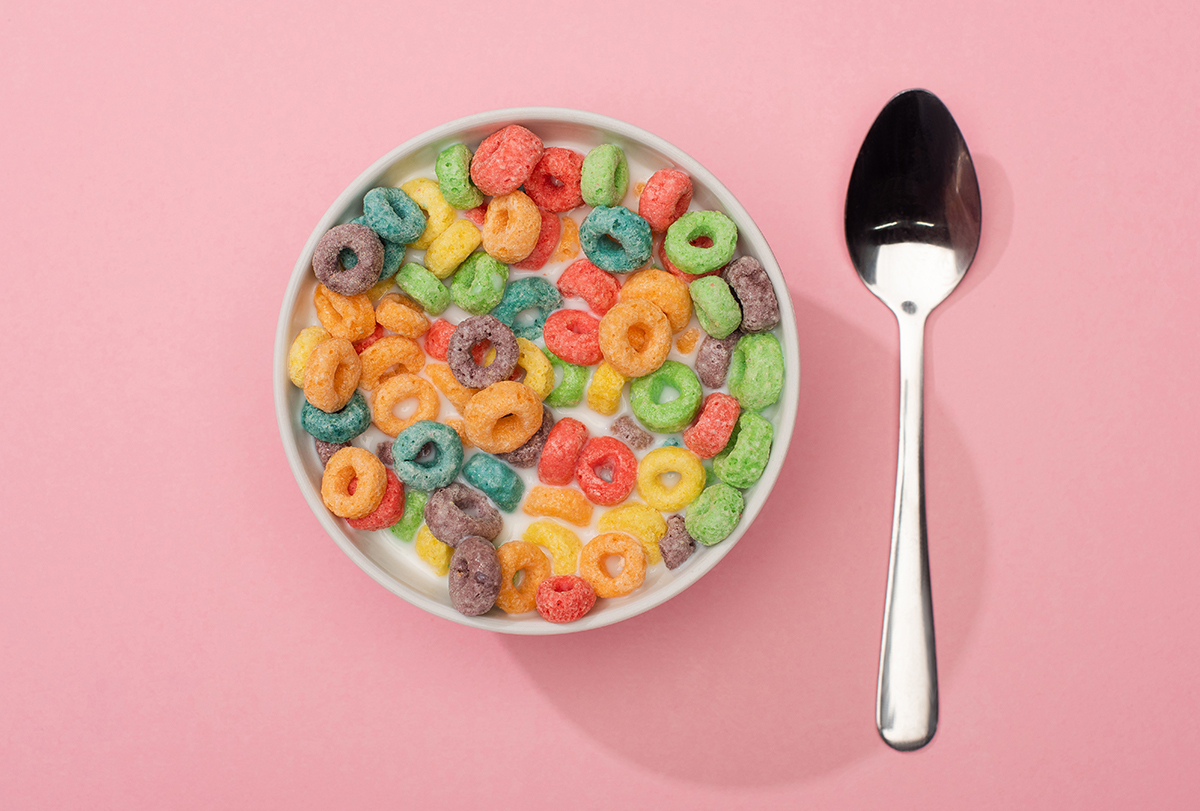
In a nutshell, weight loss occurs when you eat lesser calories than you burn. (1) Certain foods claim to aid in burning more fat than others: oats, eggs, yogurt, beans, and legumes. (2)
Foods to Avoid to Lose Weight
Here are some foods to avoid on your weight loss journey.
1. White bread
White bread increases your blood sugar level very quickly. It also has little to no fiber, and during the processing of flour to make white flour, most vitamins and minerals are also lost. These factors make bread a poor choice in a weight loss diet.
A study comparing white and whole-grain bread showed white bread to contribute to belly fat and overall weight gain. (3)
2. Breakfast cereals
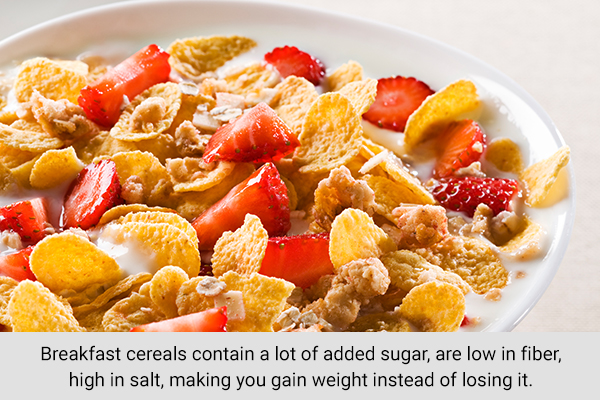
Breakfast cereals are a great go-to breakfast choice for busy people. Many studies actually report consumption of breakfast cereal is associated with a lower risk of obesity. (4)(5) However, these studies evaluated whole-grain and oat-based cereals.
So why should you avoid breakfast cereals?
Because most breakfast cereals contain a lot of added sugar, low fiber, low protein, and high amounts of salt, (6) which can make you gain instead of lose weight or may not contribute to weight loss at all.
3. Cereal bars
Cereal bars such as granola or muesli bars are made with seemingly healthy ingredients such as oats, whole grains, nuts, seeds, and dried fruit pieces. They may seem healthy choices when it comes to fulfilling hunger between meals or as a post-workout snack.
However, you must read the ingredients well as most of these commercially available granola bars can contain high amounts of added sugar and fat. (7) A 2015 market study found that none of the cereal bars in Australia were low in added sugar. (8)
Many healthy recipes are available to make cereal bars or mixes at home and these are preferable over store-bought ones.
4. Fruit candies
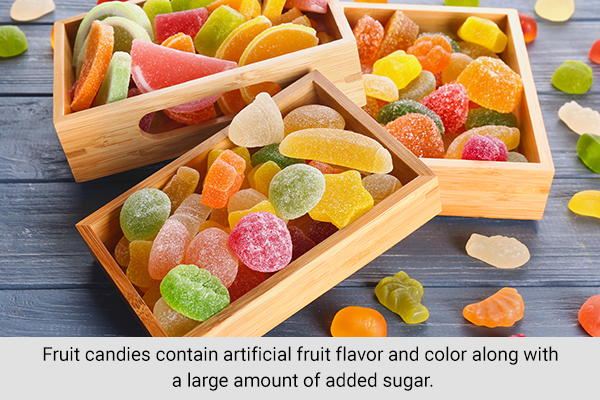
You may think candies made from fruits such as fruit jellies or commercial fruit leathers may be better alternatives to hard candies. However, most of these contain artificial fruit flavor and color along with a large amount of added sugar.
Studies have found that consumption of candies resulted in an increase in weight. (9) In adolescent children, it can also increase hyperactivity and lead to difficulty focusing. (10)
Choose healthier alternatives such as dried fruit instead. You can also make your own fruit leather at home by dehydrating fruit purees of guava, mango, strawberries, etc. These will still contain high amounts of sugar so they need to be eaten in limited quantities.
5. Chips
Chips are mainly made by deep-frying potatoes, making them a fat-rich snack.
A study comparing two different snack foods, chips and popcorn, found that the participants had a high energy intake after eating even 1 cup of chips. It also did not fulfill hunger, which means you may eat more food at subsequent meals. (11)
In the study, popcorn was a better food choice to satisfy hunger and reduce the intake of food.
6. Flavored yogurt
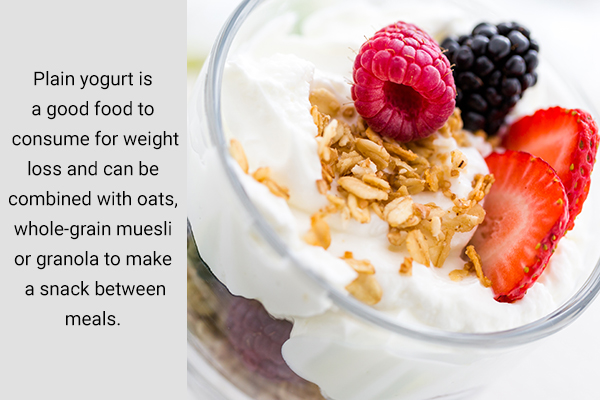
Plain yogurt is a good food to consume for weight loss and can be combined with oats or whole-grain muesli or granola to make a snack between meals.
However, market research has found flavored and drinkable yogurts to have high amounts of added sugar per serving. Even products labeled organic have high sugar content. (12)
Instead, you can add fresh fruit pieces and fruit purees to half a cup of plain yogurt and make your own sugar-free version at home.
7. Fast foods
It is no surprise that fast foods are often deep fried and are high in fat, often saturated, and can directly increase weight and lead to other illnesses such as type 2 diabetes, heart diseases, and even cancer. (13)
Even if fast foods are promoted as healthy with labels of whole grain (such as burger buns) or low fat, they may not necessarily be a healthy choice.
8. Sodas and energy drinks
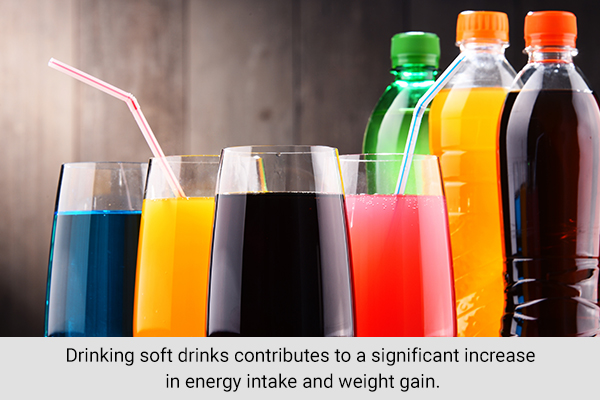
Soft drinks and sodas are easy choices to satisfy thirst on a hot day or after an intense workout. However, they are loaded with sugars, food colors, and additives.
Drinking soft drinks contributes to a significant increase in energy intake and weight gain. (14) It is the easiest way to gain weight and can put a roadblock in your weight loss journey.
Instead, consume fresh fruit juices with plain soda water or a dissolvable vitamin C tablet to get that effervescent effect without the harmful effects of added sugar.
9. Packaged fruit juices
Nowadays, many bottled fruit juices are available with claims of being low in added sugar, made from real fruit, or without additives. While some of these claims may be true, packaged fruit juices are not entirely free from added sugars. Therefore, it is best to avoid them.
Make your own juices at home instead, as 100% fruit juices are associated with a lower risk of many diseases. (15)
10. Alcohol
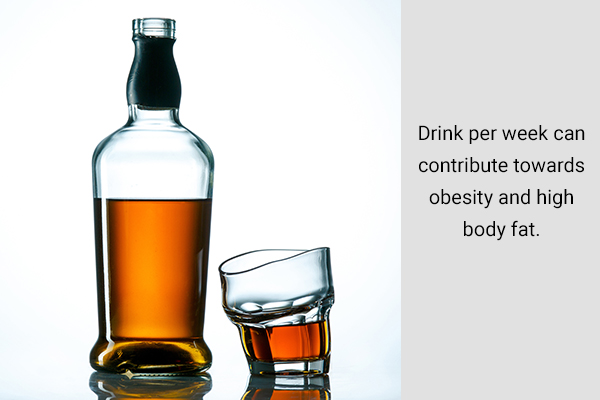
Alcohol is considered empty calories as it does not contain any nutritional benefits. Consuming more than 1–2 drinks per week can contribute to obesity and high body fat. (16)
Some evidence suggests that the small polyphenol and antioxidant capacity of red wine have a protective effect on the heart. (17) However, a similar antioxidant activity can be obtained with the consumption of fruits and vegetables.
Most-Asked Questions
Can I take protein powders during my weight loss journey?
Protein powders are good for supplementing the diet to fulfill your daily protein requirement. However, if you consume protein powders without proper exercise, it will end up making you gain more weight in the form of excess calories.
Should I stop tea and coffee for weight loss?
One to two cups of tea and coffee are not going to make you lose or gain weight. However, avoid getting novelty coffee with tons of flavorings, syrups, and cream.
Final Word
Weight loss is a mix of diet and behavioral and lifestyle changes that need to be made for life.
Foods that make you gain weight are also risk factors for diseases of the heart, type 2 diabetes, hypertension, and cancer. Choose whole foods and natural ingredients to support a healthy long-term lifestyle change.
- Was this article helpful?
- YES, THANKS!NOT REALLY


